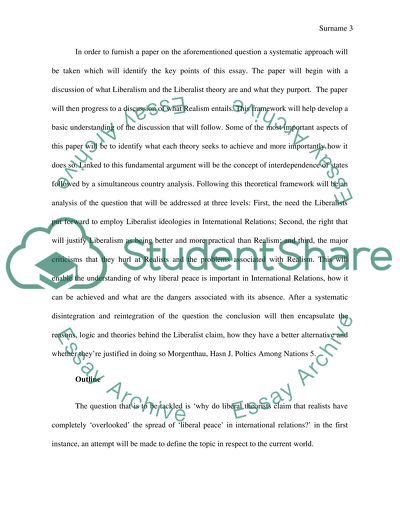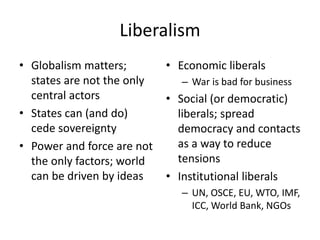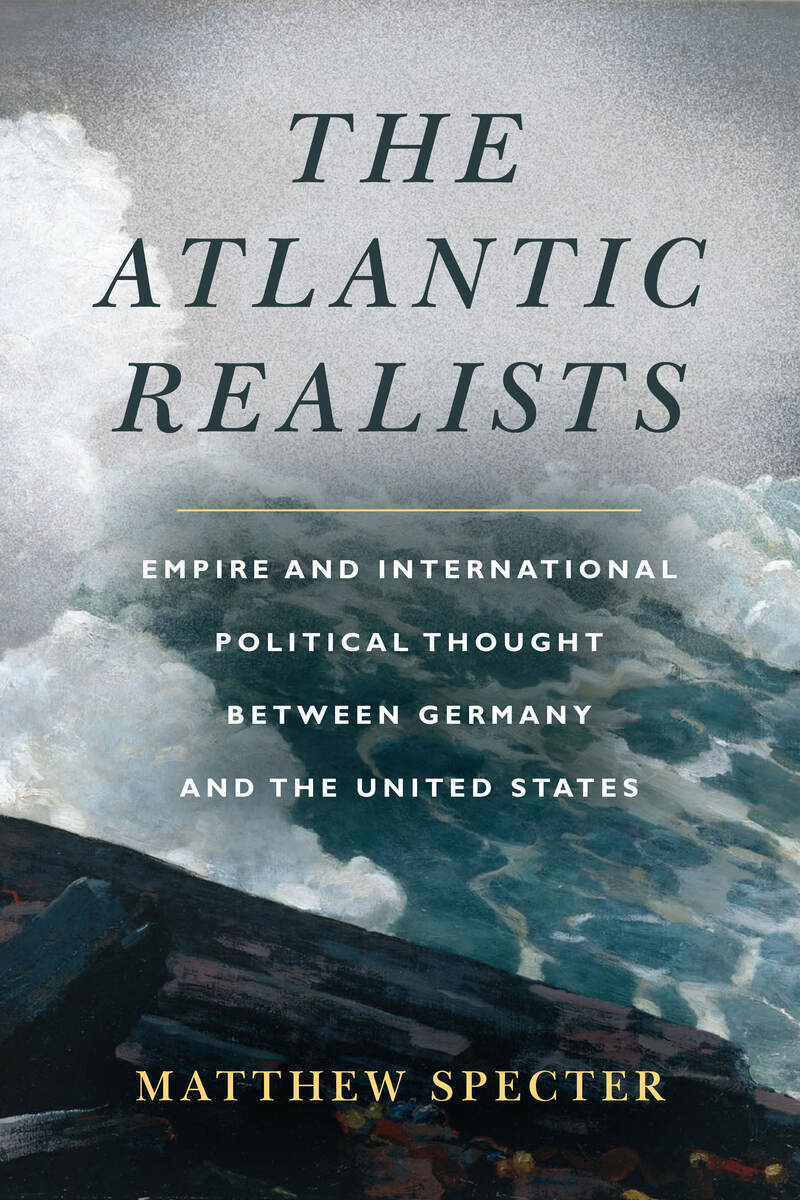Realism and liberalism are two major theories in the field of international relations that have significantly shaped the way states interact with each other in the international system. These theories offer distinct perspectives on the role of the state, the nature of international relations, and the proper course of action for states to take in the international arena.
Realism is a theory that emphasizes the role of the state as the primary actor in international relations and the pursuit of self-interest as the driving force behind state behavior. Realists believe that the international system is characterized by anarchy, meaning that there is no central authority to enforce rules and regulate the behavior of states. In this context, states must rely on their own strength and resources to ensure their security and protect their interests.
Realists also believe that states are motivated by a desire to maximize their power and security in the international system, and will often engage in aggressive or selfish behavior in order to achieve this goal. This can lead to conflict and tension between states, as each tries to assert its own interests over those of others. Realists also argue that moral considerations and international law are often secondary to the pursuit of national interests, and that states should not be constrained by these considerations in their foreign policy decisions.
Liberalism, on the other hand, is a theory that emphasizes the role of international institutions, international law, and cooperation between states in shaping international relations. Liberals believe that the international system is not necessarily characterized by anarchy, but rather that states can work together to create a more stable and peaceful world through cooperation and the establishment of international norms and rules.
Liberals argue that states have shared interests and that cooperation can lead to mutual gains, rather than the zero-sum game often described by realists. They also believe that moral considerations and the promotion of human rights should play a central role in international relations, and that international institutions can serve as a means of promoting cooperation and resolving conflicts peacefully.
Despite these differences, both realism and liberalism have had a significant impact on the way states interact with each other in the international system. Realism has influenced the way states approach issues of security and self-interest, while liberalism has shaped the development of international institutions and the promotion of cooperation and mutual gain. Ultimately, the choice between these two theories often comes down to different priorities and values, with some states and policymakers prioritizing security and self-interest while others prioritize cooperation and the promotion of shared values and interests.
Liberalism and Realism Essay

Liberals argue that as people make self-preservation for their individual needs, they retain and depict moral perceptions, reasons, and empathy. For example, other African countries do not have much impact in terms of investing in South Africa like Botswana. Inquiry, 55 2 , 71-193. The building blocks of the state are never considered as important because the recognized figure is the state. American Realist approach worked successfully as the Soviet Union collapsed under the weight of its own contradictions and the economic strain of having to match the U.
Realism vs Liberalism Essay

In the early years after its independence, the then-American leadership realistically combined the advantages of geographical isolation, vast natural resources and the need to build a nation rather than seek pre-eminence in the world. Germany, one of the most preponderant states at the time, strived for the success that England achieved with the Industrial Revolution. Thus, the belief of realism that the state is the most important actor in the global system is disproven. Moreover, liberal states are strong enough to solve disagreements without war, although, like realists, they realize that war and destruction may be real. Therefore, in order for an individual to reach his or her full potential, reform liberalism favors government intervention in order to ensure equality among… Pros And Cons Of Neo-Liberalism To continue, it should be stated that neo-liberalism differs significantly from the canonical liberal-idealistic paradigm. As studies have shown, invalid votes, valid votes and non-voters have varying level of support for various political systems.
Realism vs. liberalism essay

To a certain extent, realism is about presenting a limited view because is very much about regionalism. International politics: Power and purpose in global affairs. The main agenda for developing such a system is to initiate cohesion between all nations and establishing independent organizations to solve conflicts between nations. Concepts of morality, ethics as understood by humanists, therefore take a back seat and are viewed in relative terms when compared to the fundamental national interests of the state Baylis, Smith and Owens 127. Looking back at the historical events and comparing them to the current international issues, there are many parallels to be noted as well as many contradictions in the ever changing global arena. On one side there are the classic liberals who believe in as little state intervention as possible, and on the other side there is the modern liberals who believe state intervention is necessary as it can develop people and create equal opportunity. There are a number of developments that have emerged in international politics, which seem to draw away the linear view about the interest of states.
Comparison between Theories: Realism vs. Liberalism

Liberalism and the comprehension of power On the other hand, liberalists approach the concept of power from an optimistic point of view. Liberalism argues for human rights, parliamentary democracy, and free trade, while also maintaining that all such goals begin within the state. In its turn, the state must prioritize national security and the prosperity of its own citizens. They argue that forming a functional universal system to be followed by all nations demands humbleness. Liberalism thus believes in possibilities that others find to be impossible with positive hopes that changes can happen. As such, they should make sure the citizens vote for party members since they will support the initiative to eliminate deployment of soldiers in a foreign land.
Liberalism vs. Realism, Case Study Example

Thus, for realists, anarchy predisposes international politics towards conflict. The difference between the two is that liberalism is a belief that the government should only minorly interfere within the daily lives of its citizens and that socialism will assure an equal distribution of wealth and goods to the population. These are a perfect example of transnational unifications, which are absolutely borderless and are extremely powerful on the global arena. Realism can also be measured in terms of its machinery in the military and as well as its successful conflicts. Once again, it was a state against another state fighting for the most gains in order to be at the top of the anarchical international system. The key elements behind this particular theoretical system lie in the belief in anarchy, evil human nature, military power and the importance and the power of a state.






